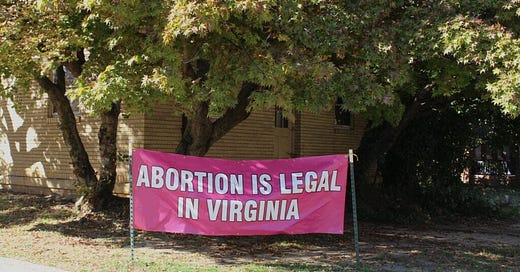Democrats’ Political Advantage on Abortion is About to be Tested
The party has the high ground in the face of draconian bans, but public opinion on the issue remains nuanced.
Since the U.S. Supreme Court handed down its Dobbs v. Jackson decision that overturned Roe v. Wade and jeopardized abortion access for millions of women around the country, several states with Republican-controlled governments have moved to ban or severely restrict the procedure. Politicians who supported those measures quickly discovered a hard truth: the American public—including a sizable share of Republican voters—does not support banning abortion. Thanks to this reality, the political fallout up to this point has almost exclusively hit the GOP:
Democrats have overperformed in 36 of 49 special elections since Dobbs—by an average margin of 7.7 points.
Republicans had a historically bad midterm for the out-of-power party in 2022, blowing a chance to make electoral gains even with an unpopular incumbent president—something that strongly correlates with the president’s party losing seats. Moreover, the midterm exit polls showed that a meager eight percent of voters supported total abortion bans.
In every post-Dobbs ballot measure so far related to abortion, voters have chosen to protect abortion rights.
Some Democrats seem to have taken all this to mean that the public is largely pro-choice and wants few, if any, restrictions on the procedure.1 However, the reality is more complicated. According to Gallup, Americans are only slightly more likely to identify as “pro-choice” (52 percent) than “pro-life” (44 percent). Moreover, just 28 percent of midterm voters said they believed abortion should be “legal in all cases,” and further polling has found that voters nationally—including fully 60 percent of Democrats—say they only support allowing abortions up to 15 weeks.2
So, while Republicans have paid steep penalties over the past year for supporting more restrictive measures, there also seem to be signs that the public is open to some level of limitations on abortion. And some Republicans appear to be recalculating their party’s draconian approach to the issue and even looking for openings to go on the offensive against Democrats. Earlier this summer, for instance, pollster and former Trump advisor Kellyanne Conway penned an op-ed arguing that pushing a 15-week ban (rather than anything more restrictive) could at least somewhat neuter Democrats’ advantage on this issue.
We may not have to wait long to find out whether such a pivot works: elections for Virginia’s state legislature are set for early next month. Currently, abortion is allowed in Virginia through the first two trimesters (or roughly 26 weeks of pregnancy).3 Democrats, who hold a narrow majority in the state Senate—preventing complete Republican control of the state government—have already moved to claim the advantage on the abortion issue, arguing that Republicans in the state (as elsewhere) will use a full legislative majority to ban abortion entirely.
However, Virginia Republicans are working to turn the tables, launching a recent ad campaign claiming Democrats want “no limits” on abortion. Meanwhile, the state’s relatively popular Republican governor, Glenn Youngkin, has taken a more moderate approach to the abortion issue than other Republicans around the country, proposing a 15-week ban instead of six-week or total ban.
Some left-of-center observers have already begun suggesting that these moves from Virginia Republicans are just the latest in a long line of political missteps around abortion that have previously created electoral penalties for their party. Reality is more complicated, though. As noted, most of the public does not take an all-or-nothing approach to abortion—including in Virginia, a state that has leaned Democratic over the past decade. According to an October 2022 poll, while two-thirds of the state’s voters think abortion should be “legal in all or most cases,” a majority (51 percent) also said they would support a 15-week ban, no doubt a factor in Youngkin’s push for such a policy.
Assuming that their current advantage on this issue will endure indefinitely could lead Democrats and their candidates to overestimate how popular their positions on this issue actually are with the public—and thus how effective this lone issue may be at helping them win elections. To be sure, off-year elections typically draw more highly engaged voters, who tend to be better educated—a demographic with which Democrats do fairly well. And the party’s overperformance in special elections could certainly be a sign of how motivated their voters still are to get out and vote.
The results in Virginia will tell us soon enough whether Democrats can bank on this issue to win moving forward.
Indeed, in response to Dobbs, several Democratic-controlled states have moved to expand access to abortion.
Even more interesting: the same poll showed that a higher share of men (31 percent) than of women (25 percent) support allowing abortions beyond 15 weeks.
There are also third-trimester exceptions to protect the life of the mother.





